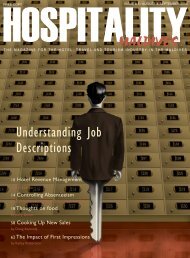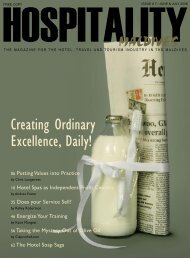Don't Let Your Systems Drive Your Customers Crazy! - Hospitality ...
Don't Let Your Systems Drive Your Customers Crazy! - Hospitality ...
Don't Let Your Systems Drive Your Customers Crazy! - Hospitality ...
You also want an ePaper? Increase the reach of your titles
YUMPU automatically turns print PDFs into web optimized ePapers that Google loves.
SERVICE<br />
The Dangers of Being a Host<br />
A<br />
recent dining experience of mine might be of interest to<br />
some of you. My girlfriend and I go to a particular restaurant<br />
at least once a week. As people have a habit of doing,<br />
we had discovered a place that impressed us, and we’d fallen into<br />
a pattern of regular patronage. We knew what we were going to<br />
get; there were never any surprises just good food and informed,<br />
friendly service.<br />
The food is a blend of traditional Japanese artistry and local<br />
ingredients. Always very fresh, always presented superbly, and<br />
good value. The ambiance is modern, airy, chic. We bring the tone<br />
of the place down by coming-in dressed in tracksuits after playing<br />
sport in the evening.<br />
I’d never had any disappointments eating there, so when a<br />
group of my friends prevailed on me for a suggestion for a good<br />
night out, I broke my usual golden rule and extolled it’s virtues. I<br />
should have known better.<br />
If a hospitality consultant gives a restaurant recommendation,<br />
it is taken as gospel and creates very high expectations. I’ve<br />
found that very few restaurants are consistent enough in their<br />
performance for me to feel totally confident in their delivery. I<br />
might go there myself, but I don’t usually recommend them to<br />
others.<br />
This particular night everything conspired against me. Sadly,<br />
I was there as the host, cringing in excruciating embarrassment as<br />
a performance worthy of Basil Fawlty unfolded around me.<br />
We arrived at about 8.00pm, and were seated and offered<br />
a drink. I noticed that there were less front of house staff than<br />
“ `Bring me the owner’s head on<br />
a plate!’, I seethed inside, smiling<br />
through clenched teeth. ”<br />
normal and that the tables were filling-up fast. The staff were<br />
starting to move rapidly and gesticulate in that urgent manner<br />
that denotes a foodservice system that is beginning to unravel at<br />
the seams.<br />
We ordered several large platters of sushi and sashimi. My<br />
guests commenced a lively conversation which was punctuated<br />
by the waiter returning at regular intervals to take orders for more<br />
drinks. My friends were not being bashful with the alcohol, and<br />
I’d foolishly suggested that Tadcaster Porter (a fairly potent stout)<br />
went particularly well with sushi. They accepted this recommendation<br />
with gusto and bounced into it.<br />
Out of the corner of my eye I could see the restaurant owner<br />
and the waiters going into little huddles and conversing in an animated<br />
manner. What was happening? I was beginning to become<br />
concerned we had been there nearly 45 minutes, we’d had about<br />
six large glasses of stout each, and no food in sight. I called the<br />
waiter.<br />
“I’m terribly sorry, Mr Eldred. We have twice the number of<br />
customers we usually get on a Thursday night, and every table has<br />
by Tony Eldred<br />
ordered sushi. There will be a delay.” I confirmed this myself by<br />
checking-out the sushi chef — this `sensitive artiste’ was resisting<br />
all efforts to increase his productivity and was hiding behind a<br />
decidedly hostile expression and a malevolent looking cleaver.<br />
“I thought you said this was a good restaurant, Eldred. I’m<br />
starving! Where’s the food?” It began good naturedly and slowly<br />
rose to a venomous crescendo. An hour had passed; still no sushi.<br />
I wanted to run away. It was time for action. I did the only thing<br />
that seemed sensible at the time: I ordered sake for myself and<br />
drank it. Then I ordered another.<br />
The waiter finally approached the table after an hour and<br />
twenty minutes and deposited three small plates of sushi, each<br />
containing five pieces, on our table. You could feel the wave of<br />
disappointment. “That’s not what we ordered. Where’s the sashimi?<br />
This won’t feed six people,” said one guest. “Eldred, this is<br />
ridiculous, what kind of restaurant have you brought us to? I<br />
thought you were supposed to be the expert.”<br />
Six stouts and two sakes can have different effects on different<br />
people. I was half pissed and furious. Out of the hundred or<br />
so times I had visited the place, why had they chosen to screw up<br />
on the occasion I had brought guests? Why me Lord? . . . I called<br />
the waiter.<br />
He wasn’t having a good night either, and was obviously fedup<br />
with dealing with irate customers. His response to my assertion<br />
that we were not happy brought the full, shrill, bitchy, handson-hips<br />
routine: “What are you complaining about? We’ve given<br />
you something to eat! I wrote the right order on the docket, it’s<br />
not my fault.”<br />
`Bring me the owner’s head on a plate!’, I seethed<br />
inside, smiling through clenched teeth. I stood-up<br />
and went to confront the great man himself. He was<br />
having a bad night too. Stifling the intense urge to<br />
commit a violent crime of passion, I approached him<br />
and told him of my disappointment. “What can I<br />
do?” he replied with a shrug more reminiscent of Tel<br />
Aviv than Tokyo.<br />
Eventually we ordered something they could supply and we<br />
all got fed after two hours waiting. The crowd died down, the sushi<br />
chef became less menacing and the owner regained his composure.<br />
He was most apologetic. He even sent us a complimentary<br />
bottle of wine. Nice one — more alcohol — that’s just what<br />
I felt we needed. My friends were already primed to the point<br />
where they were drooling and talking shorthand.<br />
Despite the owner’s attempt at conciliation, they were so unimpressed<br />
with the place they elected to leave a ten cent tip after<br />
a deliberately loud debate.<br />
I still get rubbished about that night, and I’ve had reservations<br />
about going there ever since. I know that I’m being unreasonable;<br />
one in a hundred isn’t a bad screw-up ratio, but now I’ve<br />
got this subconscious mental association linking the restaurant<br />
with pain and social humiliation.<br />
Tony Eldred is the Managing Director of hospitality management consultants Eldred<br />
<strong>Hospitality</strong> Pte. Ltd. For more information visit www.eldtrain.com.au or email<br />
Tony directly at teldred@eldtrain.com.au!<br />
58 HOSPITALITY MALDIVES OCTOBER/NOVEMBER 2006

















